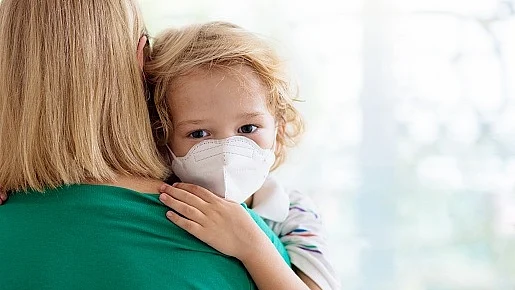Complications in kids hospitalised with Covid: Lancet
A research identifies a wide spectrum of neurological complications in children and suggests they may be more common than in adults admitted with Covid-19

Although the risk of a child being admitted to hospital due to Covid-19 is small, a new UK study has found that around 1 in 20 children hospitalised with Covid developed brain or nerve complications linked to the viral infection.
The research, published in The Lancet Child and Adolescent Health, identifies a wide spectrum of neurological complications in children and suggests they may be more common than in adults admitted with Covid-19.
"The risk of a child being admitted to hospital due to COVID-19 is small, but among those hospitalised, brain and nerve complications occur in almost 4 per cent," said researcher Stephen Ray from the University of Liverpool.
"Our nationwide study confirms that children with the novel post-infection hyper-inflammatory syndrome PIMS-TS can have brain and nerve problems; but we have also identified a wide spectrum of neurological disorders in children due to Covid-19 who didn't have PIMS-TS," Ray added.
While neurological problems have been reported in children with the newly described post-Covid condition paediatric inflammatory multisystem syndrome temporally associated with SARS-CoV-2 (PIMS-TS), the capacity of Covid-19 to cause a broad range of nervous system complications in children has been under-recognised.
To address this, the researchers developed a real-time UK-wide notification system in partnership with the British Paediatric Neurology Association.
Between April 2020 and January 2021, they identified 52 cases of children less than 18 years old with neurological complications among 1,334 children hospitalised with Covid-19, giving an estimated prevalence of 3.8 per cent.
This compares to an estimated prevalence of 0.9 per cent in adults admitted with Covid-19.
Eight (15 per cent) children presenting with neurological features did not have Covid-19 symptoms although the virus was detected by PCR, underscoring the importance of screening children with acute neurological disorders for the virus.
For the first time, the study identified key differences between those with PIMS-TS versus those with non-PIMS-TS neurological complications.
The 25 children (48 per cent) diagnosed with PIMS-TS displayed multiple neurological features including encephalopathy, stroke, behavioural change, and hallucinations; they were more likely to require intensive care.
Conversely, the non-PIMS-TS 27 (52 per cent) children had a primary neurological disorder such as prolonged seizures, encephalitis (brain inflammation), Guillain-BarrA¿ syndrome and psychosis.
In almost half of these cases, this was a recognised post-infectious neuro-immune disorder, compared to just one child in the PIMS-TS group, suggesting that different immune mechanisms are at work.
Short-term outcomes were good in two-thirds (65 per cent) although a third (33 per cent) had some degree of disability and one child died at the time of follow-up. However, the impacts on the developing brain and longer-term consequences are not yet known.
Follow us on: Facebook, Twitter, Google News, Instagram
Join our official telegram channel (@nationalherald) and stay updated with the latest headlines
